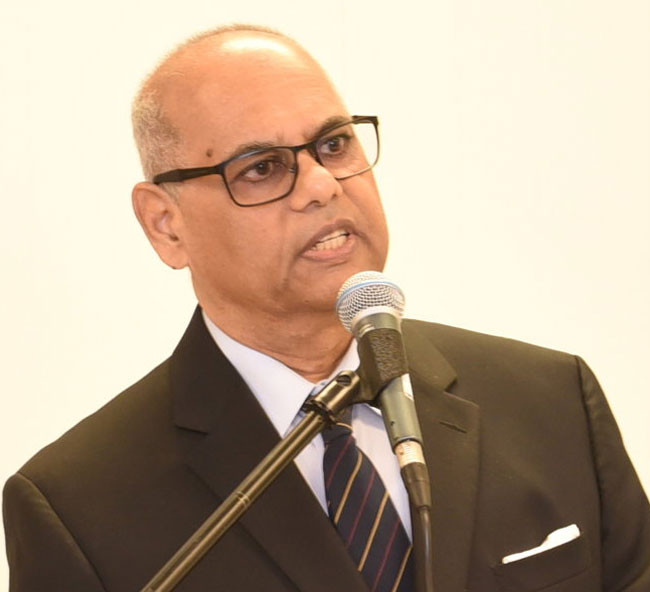Dear Editor,
As the debate on the need to implement biometrics for voter identification in Guyana’s general elections continues, it seems that the focus is really on electronic verification of fingerprints and not facial recognition, voice recognition, or iris (eye) scan. So far, objection to biometrics by GECOM and other opponents is based on the fact that Guyana’s constitution does not allow for this. In my view, even with constitutional amendment there are other factors that GECOM must consider before making a decision on computer verification of fingerprints.
If we look at the aftermath of the 2020 general elections, Mr Khemraj Ramjattan, then Minister of Public Security, claimed he had to expel from the country two Russians with computer equipment intended to rig the elections in favour of the PPP. At the time his story was laughable and dismissed since no computer was used in the voting process. However, had computers been used in any part of the voting process, e.g., fingerprint verification, his story could have gained credibility in some quarters with serious consequences to post-election peace and stability.
Another matter relating to the last elections which is also relevant is the control over the use of computer equipment. According to press reports, Mr Aneal Giddings, then GECOM’s Information Technology Manager, disregarded instructions from the Deputy Chief Elections Officer during the SOP tabulation process to leave the computer server unattended and vacate the Ashmin building when she ordered evacuation on claim of a bomb threat. Instead, Mr Giddings took the server with him as he left the building to ensure its safeguard and security. In view of all the shenanigans that transpired with the tabulation and the use of unofficial documents to announce result of vote counts, one can only guess what could have been the consequence had he not secured the server in his care. With biometrics as envisaged by Mr Vincent Alexander, the key promoter of biometrics, on Freddie Kissoon’s show of November 13, 2024, GECOM will have to provide battery operated, handheld devices for 2,500 polling stations (source of 2,500 is worldwide elections database on Guyana) across the country, each requiring an operator. Under such condition, how can Guyanese be assured that standard procedures may not be violated by at least a few operators, if directed by someone in authority.
Based on my limited knowledge of computer security issues, from my perspective as the manager of a programme that maintained a large computer database which allowed hundreds of computer operators from varying locations to access the database, it seems that security issues for each of these handheld devices to access either a central database or 2,500 local databases with voters’ information and signature could be a major concern.
In relation to the existing verification process, the words of the European Union (EU) Ambassador, Mr. Fernando, who was also an election observer, are pertinent. In his appearance before the elections COI, he explained the process of checking voter identity at polling stations: “It was safeguard after safeguard after safeguard. It was impossible to cheat…I was positively impressed”. And on Freddie Kissoon’s show of November 20, 2024, Mr Jonathan Yearwood of ANUG provided greater details on the process at polling stations. He stated that a voter must first present identification to the police officer at the polling station before being allowed to enter. The identity of the individual is next checked by the poll clerk, then by party scrutineers, and finally by the presiding officer. With such immense scrutiny, one has to agree with the EU Ambassador “It was (is) impossible to cheat”.
While fingerprint scanners provide a high accuracy rate, they are not infallible. The best result reported with scan of one finger is 98.6%. According to Almas Industries, a company that offers security solutions for businesses, “fingerprint scanners may falter in accurately recognising a user’s fingerprint under certain conditions. Dirty, wet, or damaged fingerprints can cause the scanner to fail, leading to frustration and delays in the authentication process”. Also, correct placement or positioning of a finger on the scanner is important for accuracy. Users of cell phones who use their fingerprints to access their phones are well aware of this. In addition, with 2,500 operators of handheld scanners it is likely that either intentionally or unintentionally, some operators may contribute to rejection of a fingerprint. As well, initial capture of a fingerprint is critical. Poorly captured fingerprint will result in false rejection.
In Guyana where results of general elections are often contentious, GECOM may want to heed the advice in the Stabroek News Editorial of August 12, 2024 “The five-month impasse that delayed the transition in governments had nothing at all to do with a bloated list of voters or malpractices at polling stations…it is worth repeating that the vast majority of the hundreds of polling day workers on March 2nd 2020 worked industriously and heroically to enable voters to cast their ballots, for these to be counted, results posted up outside polling stations and the relevant documents transmitted to the district returning officers. That system functioned marvellously and does not require biometrics or cameras to create grounds for upheaval”.
Harry Hergash
